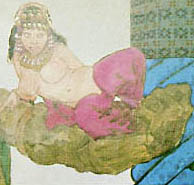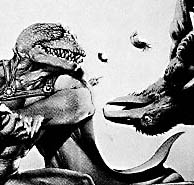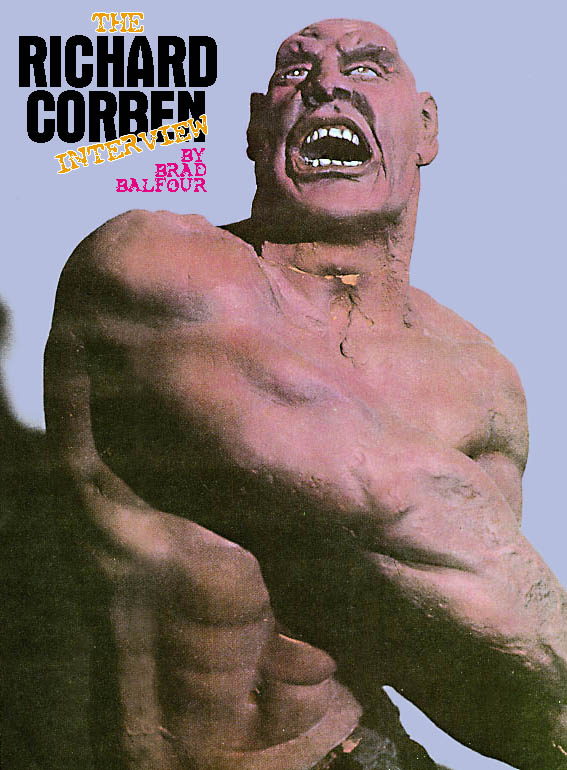The Richard Corben Interview, Part 3(3)
by Brad Balfour
Copyright © 1981 Brad Balfour. Here on this web site by courtesy of the author.
Appeared in Heavy Metal #53, Aug. 1981 (vol. V no. 5), pages 8-13,
the Table of Contents, Copyright © 2001 Heart-Attack-Series, Ink!, SidSid Keränen.
TABLE OF CONTENTS:
The Richard Corben Interview, Part 1(3)
The Richard Corben Interview, Part 2(3)
Richard Corben's Answer for Interviewer
The Richard Corben Interview, Part 3(3):
Primitivity and Cheap Movies
Fine Art and Overlay Color Techinque
Working Techniques and Collaborations
Martial-arts
Sophia Loren
Richard Corben's visual impact on the comics world has been immense; his style is so unparalleled that he has few imitators of any note. In bridging the gap between conventional comics, the undergrounds, and the revolutionary bande dessiné, Corben has not only reached the pinnacle of aesthetic success in the field but soared above it. As he has done so, his own history has taken on a mythic quality.
When the French embraced his work, they did it not because of a shared vision but because Corben so completely represented the classic values of American comics and the heroic-fantasy tradition. He has done more than merely update, for he also depicts the underbelly of the America of Norman Rockwell (incidentally, an artist whose work he enjoys), as well as convolutes the bold, brutish visions of Burroughs (Edgar Rice) and R. E. Howard. Though wrung through the sixties and seventies, Corben's art embodies a traditionalist aesthetic. His comception of panel and page framework is both linear and narrative, compared to the psychedelic excursions of Moebius (the French artist he credits as the most influential European voice). Corben's method of storytelling is so grand that it overwhelms. He tells frontier tales in a dramatic way, not complicated by overt philosophizing. Instead, his craft and precision are almost philosophic in their realization; Corben's attention to detail, his love of the masculine, and his almost primitivistic body worship are both refreshing and yet somehow regressive.
Ultimately, if only one thing is wrong with his work, it is that he's too much Corben, too much trapped in being himself. Perhaps his recent exposure to Europe will have provided new influences. While the publication overseas of both a 200-plus-pages Corben collection and the revised Mutant World book may announce a summation of one phase, Corben already looks to moving ahead.
- B.B.

Primitivity and Cheap Movies
BRAD BALFOUR: What do you think about Kansas City?
RICHARD CORBEN: It's a middle-sized city - it's got everything I want and that's why I don't have to move to New York.
Did you ever want to see primitive lands?
Yes - I enjoy exploring ancient ruins. In fact, I even considered going to Mexico. The Aztec and the Celts are very remote civilizations. What they have in common is that they're both involved with intricate designs. I like primitive imagery because it is so interesting and at the same time so separated from modern society.
You're interested in video as well as in film and drawing.
I feel that video, as opposed to TV and movies, put a person's enterntainment under their own control, at last. They don't have to wait for a show to come on television. They can buy a prerecorded tape and watch it whenever they feel like it. If they don't want to watch all of it, they don't have to, or if they want to watch only some of it, they can.
I'm interested in the forties and fifties horror movies, some of the old science-fiction movies, and some of the more recent horror and science fiction too. I've got about half a dozen of Roger Corman's Poe movies. They aren't the greatest movies, but I study these films to see if I could make them different, if I were making them.
So, Corman is a favourite director?
Corman, because he's one of the most efficient directors. He could bring out a movie in practically no time. Also, Ray Harryhausen - I'd like to meet him. But when he's doing his work, it would be impossible - he's very secretive. I think Fellini is a very interesting director. I'm not saying he's got great films, but I think he's the greatest caster of films ever.
Whom or what does Richard Corben recommend as reading?
There's certain subjects. I'm interested in dinosaur books, books on animals - and there's Making Money, Making Movies. It's a very discouraging book. It rips aside the hypocritical facade of theatrical films. Their end purpose is to sell popcorn and candy.
Fine Art and Overlay Color Technique
Whom do you admre in fine art?
I admire Picasso because he was so prolific in so many different fields, though I wasn't really into him in all things.
What kind of artwork do you hate?
I don't like pretensions. For example, if an artist has a simple and rather primitive style and pretends it's great art, well, I find that rather silly.
Are there any famous cartoonists you would like to meet in person?
I would like to meet Jack Davis, Wally Wood, and Alex Toth. Several people have noticed the similarity of my stuff to John Severin's; and Wally Wood was one of my favorites. Practically any E.C. artist, Jack Davis or Reed Crandall of any of them. And don't forget Graham Ingels, especially.3
There's a certain quality of Virgil Finlay to your work.
That quality is probably a coincidence. When my style was being formed, I wasn't really into Finlay. I have a conscious influence from the Baroque and Renaissance artists, such as Rembrandt and Michelangelo, and from the Greek and the Roman too - the classic period, where they had the fully rounded statues. I guess, in graphic terms, what I mean is trying to make the work simplified in some ways or ornate in some ways. I try to be inventive in every way, not only in the stories I do but in the techniques I use. I invented a techinque - my system of color overlays - which apparently nobody can understand, but it's really very simple. The luminescent quality of my color overlays is derived from the way I combine the colors. I shoot the photomechanical separations myself, to a slightly higher contrast than a normal photo engraver would do. This makes the colors appear brighter. I'm excited when I do finally see the colors. I can see if my ideas work well or not so well.
I wonder if there's something psychological to the color qualities you stress. It's very intense; it almost burns! In terms of your visual approaches as well - certain types of angles and such - it's very cinematic, or photographic.
I feel I am still studing the medium and feeling my way around, using editing and photography. I use them as they occur to me; during the course of doing the breakdowns I'll get an idea to do a sort of editing effect or some kind of continuity effect. There's probably a danger in using an effect that draws attention to itself and then draws attention away from the story you're telling.
Though I think you have an antitechnological bias in some of your stories you definitely seem fascinated by printing technology, video technology...
My interest in technology is not from studying resistors and transistors. Mien is more of a craftsman interest. The thing I use are very simple. If there's anything complicated, it's the way the colors go together, and that's in my mind. The idea of doing overlays is simple. The way I do it is slightly different.

Working Techniques and Collaborations
What do you consider the most important thing when it comes to filmmaking?
Well, say, in The House of Usher, Roger Corman changed it into a melodrama. I would have tried for more mood and have made the house more fantastic or mysterious. I enjoyed adapting Poe for Warren comics, but there's something in me that's too schizophrenic. Part of me wants to do the adaptation as true to the written work as possible. Then another part of me wants to take off on flights of fancy, starting on their idea and going on that, and making it more my story. So it has its good and not so good. It would depend on the story. Warren's big thing was mystery and cosmic horror. I would want to add something with action and violence too. They've got a lot of weird characters, and I would emphasize that.
How do you feel about working with other people?
I like some better than others. There are several different ways of working. Jan Strnad and I work together several different ways. Sometimes he'll just write a story - a description - and then I will do some breakdowns from that to the correct paste-up length. Then I will send those back to him, and he goes over them, putting in dialogue the ways he wants. He'll send them back, and then I'll proceed with the finished art. Occasionally, when we're working with a publisher who wants to check up on each stage, he'll write the page breakdowns with the dialogue before I do our sketches, and he usually oversees the sketches before I proceed with the final art. When I work with Warren the script is done long before I even decide who's going to do it. Everything to be drawn is written down. I just follow the plans and leave room for balloons and narration. I used to do the lettering myself, but Warren didn't like my lettering.
And when you work on your own what do you do?
It might work in different ways. You start from a sketch - what Jan calls a key situation. That's the basic germ, a character or a situation of some kind. If I'm writing, I outline, maybe change it around, and then do the final writing; I do the breakdowns all at once. So I have a rough story plan just for the sketches, with the words all written in, and then I'm ready to have the type made and start with the finished art.
The writer closest to me and my attitudes is Jan. We've worked on and off for seven or eight years. It's a good working relationship because our attitudes about fantasy and science fiction are very close. Jan is against the corporate monsters and emphasizes the plight of the individual.

Martial Arts
Do you have any regrets?
Probably for not using my time in the best possible way... I feel like I wasted years doing nothing.
Do you feel that in some ways you've been born again at forty?
It's too close to tell! As I was telling Donna the other day, the greatest tragedy about life is that you don't have your wisdom and your youth at the same time. When I passed thrity it didn't bother me too much, but passing forty, I'm thinking more about it. The time has come to make a list of all the things you want to do with your life and then start doing them, because it's going to be too late otherwise. Things I couldn't attain earlier, I strive for even harder. I am willing to gamble more now becaue it's now or never!
What things?
Well, I want to produce movies, not theatrical ones, but art movies and animation. I want to do things like jump out of airplanes, but that I think I'll let pass, I want to become a black belt; I got started on that, but it's holding now. I spent a couple of years in karate, but I stopped it for a while because I was getting too beat up.
That would wean one away from it...
That was one of the problems. I started it when I was in my mid thirties, and all the other karate students were in their teens or early twenties. So I was competing with much younger people, and I found that difficult. But I did stick it out longer then many of them. I was interested in it for a long time because of Bruce Lee and the Green Hornet, and then again owing to the martial-arts boom in the late seventies. It was one of those goals that I never pursued. Same with body building. That's one of the things I intented to do, and time was running out. So, I decided to keep up with it and give it a test period of a couple of years. I found that being thin it's a double-edged sword. Your metabolism is slow at turning fuel into muscle - it would rather turn it into fat. I went up to over 200 pounds and my waistline went up very fast too. It's very difficult to stay trim. I used to drink lots of colas. I would drink two or three Cokes a day. Now, I probably won't drink one a month! It's obvious I'm not into body building for the ego. It's not so important to me, because I have my drawings. My career inflates my ego or deflates it sometimes.
How has it deflated it?
When I feel that criticisms are unjust. Also, when a piece is rejected by an editor and he wants unreasonable changes in artwork, or when I get ridiculous letters from the editors. Now I realize that people who write in to horror magazines are usually children. The readership is much younger than the ones that read Heavy Metal.

Sophia Loren
Has there ever been anyone whose brains you wanted to bash in?
Yes, there was this one person I once worked with, who shall remain nameless. He first treated me as a friend, so I didn't know how to react. But I guess it's partially my fault, because I was treating friendship and business together, whereas he used one to gain an advantage in the other. I can't forgive him for this.
It's so alien to my nature. I feel some of the business aspects of creative work are really degrading to the purity of the art, if there is any. It's not only true of comics, it's true of any business that has to do with art in any way.
But what if your hands were chopped off, what would you do? Kill yourself?
No - hands are just a tool. It would make things difficult at the beginning, but I could still draw.
Have you ever thought of suicide?
Maybe, in my early youth, but never really thinking hard enough to ever actually consider it.
Is there anything you would be a raving lunatic over? A film? Whom would you die to meet? Whom would you be dying to have sex with? What famous person?
I better not comment - well, Sophia Loren.
What would you do if Sophia walked through the door?
I can't think about her. She's another person; she has her own life.
The Richard Corben Interview, Part 1(3)
The Richard Corben Interview, Part 2(3)
The Richard Corben Interview, Part 3(3)
Richard Corben's Answer for Interviewer

The Richard Corben Interview, Part 3(3), in Heavy Metal #53, Aug. 1981, by Brad Balfour
Copyright © 2001 Heart-Attack-Series, Ink!,
Created: March 10, 2001. Modified: January 13, 2019.
